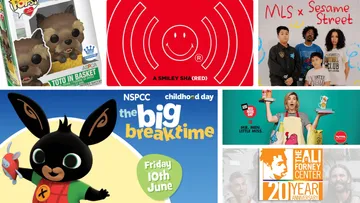There is a long history of licensed characters and celebrities getting involved in charitable causes - and for good reason. It makes sense for IP owners to get their brands and characters involved in charity campaigns as, alongside helping good causes, it can drive awareness and engagement for no financial outlay. For the charities, it is a no brainer as not only can they drive fundraising efforts but also tap into new audiences and broaden the reach of their message.
There are some great examples of licensed characters getting involved in a range of charitable causes.
The Red Nose Campaign from Comic Relief, which started in the UK but now covers a number of territories, has a long history of working with a range of IP owners to create products to drive fundraising and help engage with younger audiences. Disney, Wallace & Gromit, Mr Men & Little Miss and most recently licensing juggernaut Bluey, have all taken part in the campaign and been featured on products - particularly apparel - sold through retailers such as TK Maxx. Using different characters each year helps keep campaigns messaging and products fresh, to keep people engaged and drive fundraising.
Other recent and notable examples include Sesame Street partnering with Major League Soccer and Peace Collective on a range of clothing. Peace Collective is an apparel company well known for creating quality clothing whilst year round supporting a range of charitable causes including mental health and refugee support.
In 2022, in partnership with The American Society for the Prevention of Cruelty to Animals (ASPCA), Funko launched a Pops! With Purpose collection featuring movie pets including Einstein from “Back to the Future” and Dorothy’s pup Toto from “The Wizard of Oz.”
Some partnerships are very long standing - such as that between Disney and Make A Wish which has been ongoing for 45 years.
As well as specific charity campaigns, licensed characters are also getting involved in pro-social efforts and partnering with specific charities within that movement. Pride is a key example of this and one that has seen a lot of involvement from licensed characters, particularly where LGBTQ+ characters or messaging is already part of their brand.
Each year the DC Shop offers a range of products featuring their LGBTQ+ characters with proceeds supporting organisations such as GLSEN and Latino Equality Alliance. They also offer an extensive back catalogue of DC Pride anthologies, as well as curated collections of queer characters and creators.
The Queer Eye TV show on Netflix partners with the Ali Forney Center, an organization dedicated to protecting LGBTQ+ youth from homelessness. The "Queer Eye" Home Collection donates to the center, particularly during Pride Month, and highlights their mission of supporting LGBTQ+ youth.
Andersen Press has collaborated with “Just Like Us” to create adult clothing ranges featuring Elmer, reflecting Elmer's message of inclusivity and acceptance. And Neopets, the virtual pet community, has an apparel collection, available all year round, that donates 10% of proceeds to It Gets Better Project..
One of the most high profile organisations in this area, (RED), often partners with some of the world's most iconic brands and characters to create products to raise awareness and funds for fighting global health injustices, including AIDS. Past collaborations have included SpongeBob SquarePants and The Killers and recently SMILEY came on board as a new partner. Marking the 20th anniversary of (RED) the two brands will co-lead a global campaign with the aim of raising funds for life-saving programs that support women and girls in vulnerable communities.
As can be seen from these examples, licensing and charitable causes work well together - driving awareness and engagement for both sides and much needed fundraising for the charities involved. Hopefully over time these collaborations can expand further and help support smaller, lesser known charities that need the support the most.
